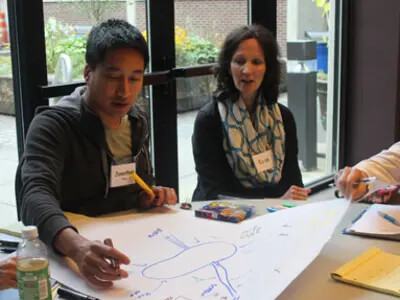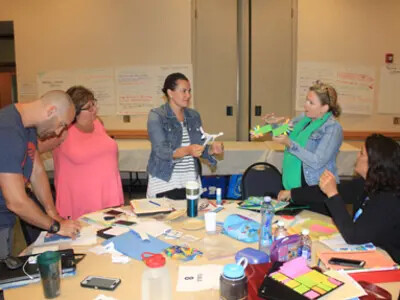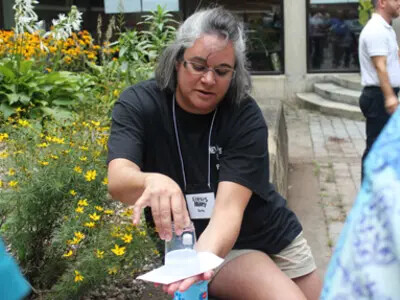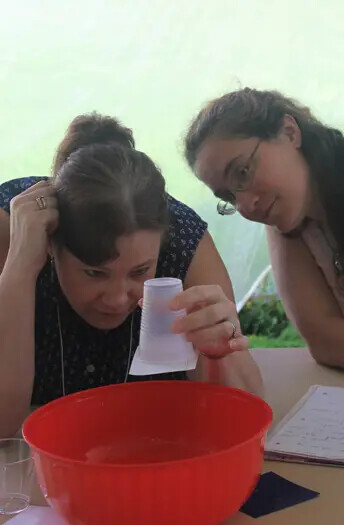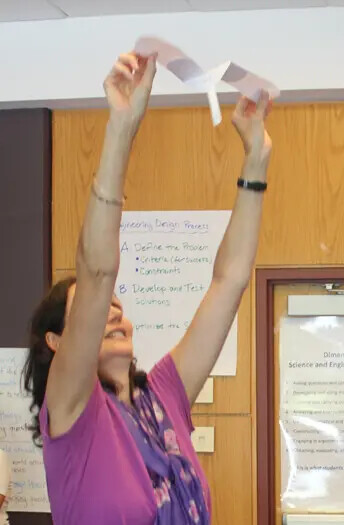NGSS TEACHER LEADER PROGRAM
The NGSS Teacher Leader Program prepares educators to take a leadership role in implementation of the New Jersey Students Learning Standards in Science (NJSLS-S) and the national Next Generation Science Standards (NGSS). This is done by engaging Teacher Leaders in a variety of professional development experiences with colleagues from other districts. Through participation in this program, Teacher Leaders deepen their understanding of the vision behind these standards while developing collaborative and leadership skills, with the ultimate goal of supporting implementation in their district. The program which began in 2014, is a collaboration between the Science Education Institute at Raritan Valley Community College (RVCC), the Rider University Science Education and Literacy Center (SELECT), the Princeton University Teacher Preparation Program, and Leadership in Science, LLC.
The vision behind the NJSLS-S/NGSS is changing how science is taught and learned, creating opportunities for students to build deep understanding of science over time. Effective implementation requires that teachers make significant shifts in the content and manner in which they teach. This will require that everyone involved in the education system – teachers, administrators, and parents – thoroughly understand these shifts. To be successful, teachers will need significant and long-term support to embrace novel instructional strategies that support student learning in science.
Through their involvement with the program, Teacher Leaders are provided with multiple opportunities to co-facilitate the consortium’s professional development programs. These include the NGSS Summer Institute and the NGSS Professional Development Workshop Series at RVCC, the CONNECT-ED program and an NGSS Workshop Series at Rider University, a variety of in-district NGSS and leadership workshops provided by Leadership in Science LLC, and the QUEST Program at Princeton University. This opportunity for Teacher Leaders to collaborate with higher education experts will build their capacity to support colleagues in their own school district.
Teacher Leaders facilitate the learning of workshop participants and provide feedback on workshop designs. They share their own experiences implementing the vision behind the standards and assist workshop participants as they plan science and engineering investigations. To support their co-facilitation responsibilities, Teacher Leaders are provided with workshop designs and resources as well as mentoring and other supports.
Currently the NGSS Teacher Leader Program consists of more than seventy K-12 educators from over forty school districts. These educators were selected based on the following criteria:
- Prior professional development experiences with the vision behind the NGSS,
- Experience with implementing these standards in their classroom,
- Ability to work well with colleagues from all grade levels,
- Support from school and district administration for participation as well as implementation of lessons learned in their district.
For a list of current teacher leaders click here.
Frequently Asked Questions about the NGSS Teacher Leader Program
- How do I become a Teacher Leader?
Participation in the program is by invitation. Teacher Leaders are identified based on the selection criteria outlined in the program description. Anyone who is interested in becoming a Teacher Leader is encouraged to submit a Letter of Interest to wil.vanderveen@raritanval.edu describing their prior NGSS professional learning experiences and classroom implementation efforts, and arrange for a separate Letter of Support from a district administrator. - What is the time commitment for participation in the NGSS Teacher Leader Program?
The requirement is that Teacher Leaders participate in at least two workshops per school year (September 1 – June 30). They should expect to be out of the classroom a minimum of two days during the school year – or more if they choose. Teacher Leaders should discuss this with their school and district administrators. Most of our Teacher Leaders are out of the classrooms between two and four days per school year. There are also additional workshop opportunities during the summer. - What is the Teacher Leader's home district's commitment in terms of release time during the school year and other resources?
The district is responsible for providing classroom coverage for when a Teacher Leader is out of the classroom (a minimum of two days per school year). There are no other costs or fees for the district. The regular workshop fees (typically $150 per day) are waived for Teacher Leaders. - Do Teacher Leaders receive a stipend for participation in the program?
Teachers Leaders will be paid a stipend of $50 per workshop during the school year for preparation. For workshops during school holidays or vacations (including the summer break) the stipend is $100 per day including preparation time. - What is the duration of participation in the NGSS Teacher Leader Program?
Teacher Leaders may participate in the program for as long as they are able and for as long as funding for the program is available; the program is not limited to one school year. - Can more than one teacher per school district participate?
We are currently expanding the program to include multiple teachers for larger school districts. - Are science supervisors or principals eligible to participate in the NGSS Teacher Leader Program?
The program is for classroom teachers. If a Teacher Leader accepts an administrator position after joining the program she/he will be able to remain in the program. - How is the NGSS Teacher Leader Program funded?
Since its inception, the NGSS Teacher Leader Program has received funding from the 3M Corporation, the Investors Bank, the PSE&G Corporation, and the Sanofi North America Corporate Social Responsibility.
